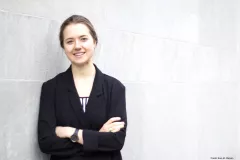
Dividing Lines
Why Is Internet Access Still Considered a Luxury in America?
Event Description
The online world is no longer a distinct world. It is an extension of our social, economic, and political lives. Internet access, however, is still often considered a luxury good in the United States. Millions of Americans have been priced out of, or entirely excluded from, the reach of modern internet networks. Maria Smith, an affiliate of Berkman Klein and the Cyberlaw Clinic, created a four-part documentary series to highlight these stark divides in connectivity, from Appalachia to San Francisco, and to uncover the complex web of political and economic forces behind them.
Notes from the Talk
“Access to the internet is essential to modern American life,” Maria Smith explained in her recent talk. Job applications, school enrollments, efficient communication with doctors—all of these tasks now require reliable internet access. However, one in four Americans lives without a broadband connection in their home. People of color and people of low socioeconomic status are disproportionately affected by this lack of access. Furthermore, the criteria for acceptable levels of internet speed are changing, as the internet continues to be a means of political participation. Upload speeds are often too slow for meaningful engagement. Those without adequate Internet access are excluded from work, educational opportunities, and civic life, meaning that they are being left behind.
Smith asks three simple questions about the persistent digital divide in the United States: who is disconnected? Where? And why? Her research has resulted in the forthcoming four-part documentary series, Dividing Lines. In her talk, Smith shared the stories of several people she has met through creating this project. For example, Anita, a farm owner in rural Tennessee, lives just outside of the bounds of Chattanooga’s publicly-owned Internet service area. Legislation that benefits telecom giants prevents the service area from expanding. So Anita spends $99 per month for satellite Internet access that barely works. In Cleveland, Ohio, Joanne worked for AT&T for 32 years. However, she lives in a redlined area that AT&T does not serve because the people in that area are considered “unprofitable.” Her remaining options for service are either too slow or too expensive.
The current state of digital inequality in the US can largely be attributed to the power of telecom corporations and their influence on both federal and local governments. In an interview from Smith’s film, Tennessee state senator Janice Bowling described the current system as a form of “crony capitalism.” Laws have been created to protect private interests, rather than for the good of the public. Moving forward, Smith argues, that the public needs to hold the FCC accountable. To become involved in digital equality activism and to find out more about the docu-series, visit Smith’s website: www.dividinglines.org.
notes by Donica O'Malley
About Maria
Maria Smith is a Project Coordinator working with Professor Susan Crawford in Harvard Law School's Cyberlaw Clinic and leading the efforts of the Responsive Communities project within Berkman Klein. She is focused on the intersection of technology deployment and social and economic justice. Maria is also a documentary filmmaker whose productions expose the impacts of and forces behind America's stark digital divides. She made her directorial debut in college with the film One Nation, Disconnected, in cooperation with the Harvard Law Documentary Studio, that details the hardship of a teenager growing up in New York City without internet access at home. Dividing Lines, a four-part series, is in production this year.
Maria first joined the Berkman Klein and Harvard Law communities as an undergraduate conducting teaching, research, and project support for Professor Susan Crawford. Maria graduated from Harvard College with a B.A. in Economics. In college she was invested in work with the Global Health and AIDS Coalition and co-chaired the annual Women’s Leadership Conference. She worked as an intern for the Public Defender Service for the District of Columbia, Connecting for Good, and Morgan Stanley.
You might also like
- communityHow Border Technologies Impact Migration
